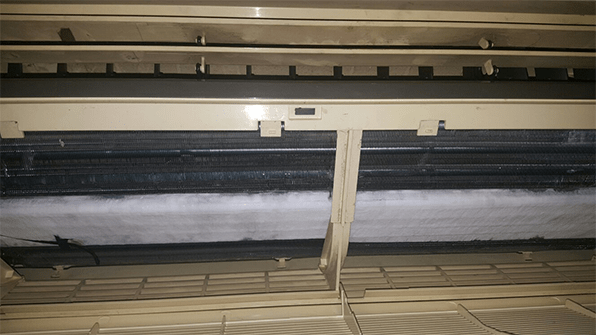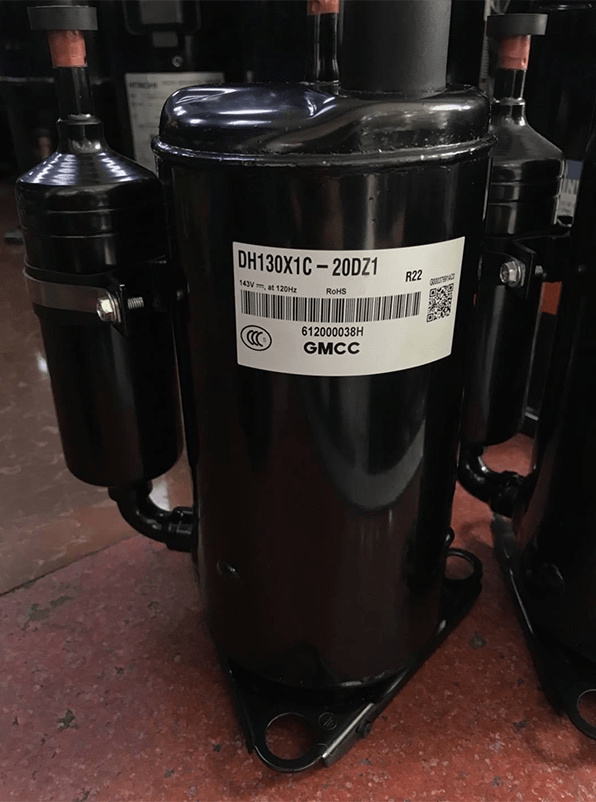
Figure 1: Air conditioner.
During the hot summer months, a well-functioning air conditioning (AC) system is crucial to maintaining a comfortable indoor environment. However, if your AC keeps freezing up at night, it can be a frustrating and perplexing problem. Freezing of the AC unit not only hampers its performance but can also lead to expensive repairs or even system failure.
In this article, we will explore the various factors that may contribute to an AC freezing up at night and discuss possible solutions to prevent the issue. By understanding the root causes and taking appropriate actions, you can ensure efficient and reliable cooling throughout the night.
1. 6 Causes of Your Air Conditioner Freezing Up at Night
1.1 Insufficient Airflow
One common reason why an AC unit freezes up at night is insufficient airflow. Proper airflow is essential for the efficient operation of the system. When there is limited air circulation, the evaporator coil, responsible for cooling the air, can become excessively cold and cause condensation to freeze on its surface. Several factors can lead to reduced airflow, such as:
● Blocked or Dirty Air Filters: Clogged air filters restrict the flow of air into the system. Over time, dust, dirt, and debris accumulate on the filters, impeding their effectiveness. Regularly checking and replacing or cleaning the air filters is essential to ensure unrestricted airflow.
● Closed or Blocked Vents: Closed or blocked vents can disrupt the balanced airflow in the HVAC system, leading to freezing. Ensure that all vents in your home are open and unobstructed to facilitate proper air distribution.
● Dirty Coils: Over time, the evaporator and condenser coils can accumulate dirt, reducing their ability to transfer heat effectively. This can result in uneven cooling and freezing. Periodic cleaning of the coils by a professional HVAC technician helps maintain optimal airflow and prevents freezing.

Figure 2: Air conditioner inner unit structure.
1.2 Refrigerant Issues
Another factor contributing to AC freezing up at night is refrigerant-related problems. Refrigerant is responsible for absorbing heat from the indoor air and facilitating the cooling process. Insufficient refrigerant levels or a refrigerant leak can cause the evaporator coil to become too cold, leading to freezing. Common causes include:
● Low Refrigerant Levels: If your AC system is low on refrigerant, it can disrupt the heat exchange process and cause the evaporator coil to freeze. This often indicates a leak in the system that needs to be identified and repaired by a professional technician. Recharging the refrigerant alone is not a permanent solution.
● Refrigerant Leak: Over time, wear and tear or other factors can cause leaks in the refrigerant lines. Leaks must be detected and fixed promptly, as they not only contribute to freezing but also impact the overall efficiency and performance of the AC system.
1.3 Thermostat Issues
A malfunctioning or improperly calibrated thermostat can also lead to AC freezing up at night. The thermostat acts as the control center, signaling the AC system when to engage or disengage based on the preset temperature. If the thermostat is faulty or set incorrectly, it can cause the AC to run continuously, overpowering the cooling process and resulting in freezing. Consider the following potential thermostat-related problems:
● Faulty Thermostat Sensor: The sensor, located near the evaporator coil, detects the temperature and communicates it to the thermostat. If the sensor is damaged or positioned incorrectly, it may not accurately sense the temperature, leading to improper cooling cycles and freezing.
● Incorrect Thermostat Settings: Ensure that the thermostat is set to an appropriate temperature. Setting it too low can cause the AC system to run excessively, surpass the cooling demand, and freeze up.

Figure 3: Frozen air conditioner evaporator.
1.4 Ventilation and Ductwork Issues
Problems with the ventilation system or ductwork can contribute to AC freezing up at night. Proper ventilation and well-maintained ducts are crucial for the efficient operation of the AC system. Here are some factors to consider:
● Leaky Ducts: Leaks or gaps in the ductwork can lead to air loss, affecting the overall airflow and cooling efficiency. This can cause the evaporator coil to become too cold and freeze. Sealing duct leaks helps maintain proper airflow and prevents freezing.
● Improper Duct Sizing: Incorrectly sized ducts can result in restricted airflow or excessive air velocity, disrupting the balance within the system. Consulting with an HVAC professional to evaluate and optimize the ductwork design can resolve this issue.
1.5 Insufficient Insulation and Sealing
Poor insulation in the walls, ceilings, or attic can allow warm, humid air from the outside to infiltrate the home. When this air reaches the AC system, it can cause the evaporator coil to become colder than normal, resulting in freezing. Similarly, gaps or leaks in ductwork can lead to temperature imbalances and freezing.
1.6 Defective Components
Various defective components within the AC system can contribute to freezing. These can include issues with the blower fan, contactor, expansion valve, thermistor, or other parts responsible for regulating the flow of air and refrigerant.

Figure 4: Air conditioner compressor.
2. How to Prevent Your Air Conditioner from Freezing at Night
Preventing your air conditioner from freezing up at night is essential to maintain its efficiency and prevent costly repairs. Here are some effective measures you can take to prevent AC freezing:
2.1 Maintain Proper Airflow
● Regularly clean or replace air filters: Dirty filters restrict airflow, so clean or replace them every 1-3 months.
● Keep vents and registers clear: Ensure that the supply and return vents are not blocked by furniture or other objects.

Figure 5: Air conditioner filter.
2.2 Optimize Thermostat Settings
● Set the thermostat to an appropriate temperature: Avoid setting it too low, as this can lead to excessive cooling and freezing.
● Use the "auto" fan setting: This allows the system to cycle on and off as needed, preventing continuous operation that can contribute to freezing.
2.3 Ensure Adequate Insulation and Sealing
● Insulate your home properly: Well-insulated walls, ceilings, and attics help maintain a stable indoor temperature, reducing strain on the AC system.
● Seal gaps and cracks: Properly seal gaps around windows, doors, and ductwork to prevent warm air infiltration and loss.
2.4 Schedule Regular Maintenance
● Hire a professional technician for regular maintenance: Professional maintenance includes coil cleaning, refrigerant level checks, and overall system inspection to prevent freezing issues.
● Schedule maintenance before the cooling season: Having your AC inspected and serviced before summer ensures it is in good condition and less prone to freezing.

Figure 6: Cleaning air conditioner filter.
2.5 Address Refrigerant Issues
● Regularly check for refrigerant leaks: If you notice a drop in cooling performance, increased energy consumption, or hissing sounds near the AC unit, have a professional technician check for refrigerant leaks and fix them promptly.
● Avoid DIY refrigerant recharge: Only trained technicians should handle refrigerant recharging to prevent further damage or safety risks.
2.6 Keep the Condensate Drain Clear
● Clean the condensate drain regularly: A blocked or clogged drain can lead to excess moisture buildup, which can contribute to freezing. Use a mixture of bleach and water to clear any algae or mold growth.
By following these preventive measures, you can significantly reduce the risk of your air conditioner freezing up at night. If you continue to experience freezing issues despite these efforts, it's advisable to contact a professional HVAC technician to diagnose and address any underlying problems with your system.
Related Info
Dehumidifier Compressor Hot: Reasons and FixesRefrigerated Display Case: Everything You Need to Know
Quick Fixes for AC Freezing up: Troubleshooting and Solutions
Cold Storage Warehouse: Everything You Need to Know
Refrigerated Truck: Everything You Need to Know


